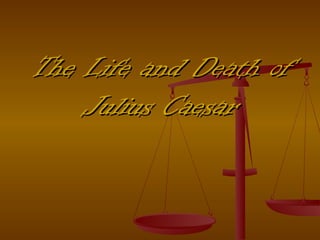
Caesar notes
- 1. The Life and Death of Julius Caesar
- 2. Family Background Julius born approx. July 12, 100 BC Mother: Aurelia Father: Gaius Julius Caesar Noble family history, little wealth or power. The month “July” is named for Caesar.
- 3. The Early Years He was betrothed to a wealthy young woman, Cossutia, but the union was called off. At 18, he married Cornelia, the daughter of a member of the Popular faction instead. They had a child named Julia (Caesar’s only legitimate child). Caesar went into hiding when the Optimate dictator, Sulla, ordered him to divorce his wife and he refused. Sulla died in 78 BC, and Caesar returned to Rome to begin a career as an orator and lawyer. Skilled as a soldier, became known for skills. Awarded the civic crown for saving the life of a citizen in battle.
- 4. Pirates of 75 BC Caesar was kidnapped on his way to Greece by Sicilian pirates. When told that they meant to ask for 20 talents for his return, he insisted that he was worth 50. He warned them that he would find and crucify them after his release. True to his word, he tracked down the pirates and crucified them.
- 5. Alliances are formed In 72 BC he was elected to military tribune. His wife Cornelia passed away in 69 BC and he married Pompeia, the granddaughter of Sulla. In 68/67 BC Caesar elected to the Senate. 65 elected curule aedile 63 - elected pontifus maximus 63 BC- he divorced Pompeia 60 BC- the first Triumvirate was formed: Caesar, Pompey the Great, and Marcus Crassus.
- 6. 59 BC - Caesar’s daughter (Julia) married Pompey the Great to strengthen their alliance. 59 BC - Caesar married Calpurnia (daughter of a leading member of Popular faction). 58 BC - to Gaul 54 BC - to Britain Julia died in 54 BC in childbirth. 52 BC – back to Gaul (Battle of Alesia)
- 7. Triumvirate Falls Crassus was killed by the Parthians in 54 BC In 52 BC Pompey moved to Optimate faction because without Julia and Crassus there is nothing that links Pompey to Caesar. Caesar and Pompey in a public split--neither could yield without loss of honor and dignity, In 49 BC Caesar led armies across the Rubicon River-- automatic civil war against Pompey. Pompey to Spain to gather troops, then to Greece. Caesar follows him to Greece.
- 8. Mid life Power 48 BC- Caesar traveled to Pharsalus to battle Pompey. Though outnumbered (20,000 to 46,000) Caesar led his men to victory. All Roman citizens captured were pardoned, including Brutus. Pompey escaped to Egypt.
- 9. Military Expansion 48 BC- Caesar landed in Alexandria and was presented with Pompey’s head. Cleopatra persuades Caesar to help her gain rule in Egypt. June 23, 47 BC- Cleopatra established as a client ruler in alliance with Rome. Caesar returned to Rome. Cleopatra gave birth to a son, Caesarion, who she claimed belonged to Caesar. It was after defeating Pharnaces in Asia Minor that Caesar coined the phrase “veni, vidi, vici” which means “I came, I saw, I overcame”
- 10. Celebration and Revolution Back in Rome he settled problems caused by Antony’s mismanagement July 25, 46 BC the unchallenged Caesar celebrated four splendid triumphs, over Gauls, Egyptians, Pharnaces, and Juba, and he sent for Cleopatra. Proclaiming himself dictator for life, Caesar would announce his decisions to the Senate and had them entered on the record without debate or vote. April, 45 BC the sons of Pompey led a revolt in Spain and Caesar had to go himself to gain victory.
- 11. Death March 15, 44BC Caesar attended the last meeting of the Senate. 60 conspirators, with concealed daggers in their togas, struck Caesar no less than 23 times as he stood at the base of Pompey’s statue. The conspirators underestimated Mark Antony, who had a whole legion behind him, as well as the keys to Caesar’s money boxes and his will.